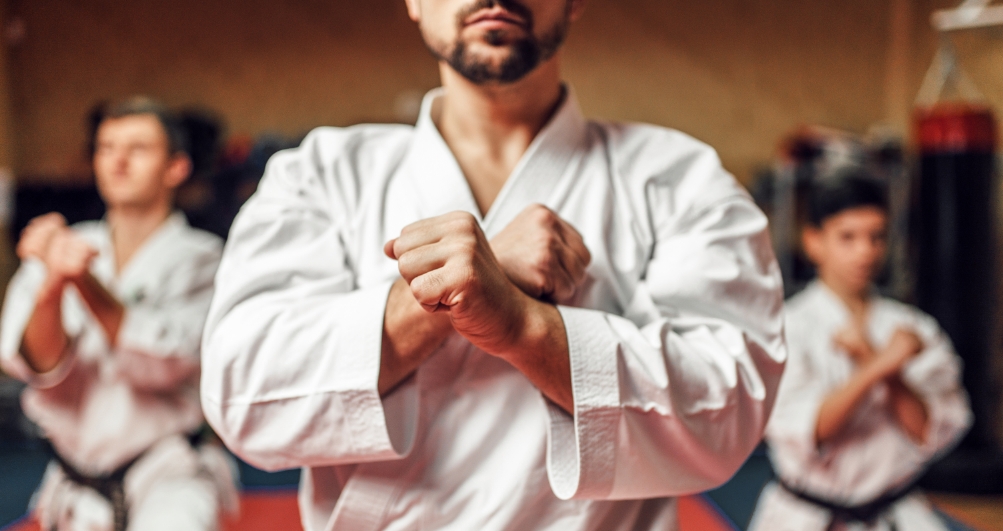Karate, Kung Fu, Taekwondo, Krav Maga, Muay Thai, etc. Along with a national cuisine, nothing quite sets a culture apart as much as its martial art. More than that, studying a martial art can give people a sense of confidence and security in themselves as well as act as a great gateway into better physical health. And perhaps most important, a lot of people think it's just plain fun! There are plenty of reasons to study a martial art, but where should you do it? And what martial art should you study?
We thought we'd break down a couple schools that offer classes and even degrees in martial arts as well as give you some ideas for which style would be right for you and what you can do with this rather unconventional degree.
Different Martial Arts
The popularity of Hollywood martial arts movies over the past several decades and the comparatively recent explosion in popularity of UFC through figures like Joe Rogan and Connor McGregor has brought continued attention to martial arts for the American public. However, anyone who looks into martial arts will soon realize that there are tons of different options for what to study, and it's not obvious what the best path forward is.
Right off the bat, we'll dispense with Mixed Martial Arts (more commonly known as MMA) just because it's not one martial art in particular as much as it is-go figure-a mix of all martial arts. As it's often described, different fighters will have training in different martial art forms, whether it's the striking-heavy karate or the grappling-heavy Brazilian Jiu Jitsu, and the outcome of the fight will determine which martial art is seen as more important in MMA. What we're really saying is that you can't "study" MMA so much as you study different martial arts and combine them into your own style. A noble goal, but not very important for our purposes.
Now, what are some of the options?
Karate
Karate is one of the most recognizable martial arts in the United States largely because of the influence of Hollywood. Figures like Bruce Lee and Chuck Norris made the sport incredibly popular early on in their careers, and then American interest in the sport exploded with 1984's The Karate Kid for, uh, obvious reasons. Who wouldn't want to be a karate grandmaster after that?
Karate emphasizes both striking and a strong, wide stance rather than grappling, and as we'll see with most other entries on this list, it has a strong foundation in spiritual practice. Karate is as much about learning how to fight and train your body as it is about attaining a kind of spiritual perfection through rigid discipline and unity with your body. As one of the most enduringly popular martial arts in the country, this is a great choice for anyone looking to get into martial arts.
Taekwondo
Also massively popular in the United States, Taekwondo is a Korean martial art with deep roots in that culture's history despite a nominal founding date in the 1940s. For the past several decades, Taekwondo has been an officially recognized Olympic sport, helping it skyrocket in popularity in the west, particularly after every summer Olympics.
Taekwondo has its distinct differences from Karate and related martial arts, but it's fundamentally similar as a striking-based martial art with a strong emphasis on spiritual practice. You'll see this kind of spiritualism emerge in many martial arts (particularly ones from East Asia), so if you're interested in studying martial arts, this is a pretty foundational component.
Judo
The first entry on this list that's quite distinct from the striking style of Karate and Taekwondo, Judo is a style designed to help use your opponent's weight and movements against them. It emphasizes fluidity and maximum efficiency of movement, and (at least in the pop culture version of Judo as seen in shows like Cowboy Bebop) it can even help a smaller fighter perform much better against a larger opponent.
Judo has also been an officially recognized Olympic sport since 1964, making it one of the oldest martial arts to hold such an honor. In addition, the maxim of "maximum efficiency" in movement that Judo practitioners subscribe to functions as both a mission statement for the martial art itself as well as a spiritual ideal to which fighters aspire.
Kung-Fu
One of the more immediately recognizable names in the world of martial arts, Kung Fu is a broad set of martial arts practices originating from China which are all categorized under the same name, particularly in the west. When studying Kung Fu, there are a lot of different routes you can take, but broadly speaking, one of its primary differentiating characteristics is the fluidity of movement associated with the style, as opposed to the rigid and quick strikes of Karate and Taekwondo.
Kung Fu also has a rich cinematic history both in America and its native China, and while we can't guarantee that you'll be able to do flying leap kicks and dodge bullets like in the Matrix, it's safe to say that you'll develop a keen sense of your own body and strong self-defense capabilities.
Now that we've gotten that out of the way and you hopefully have a good sense of where you can start (even though there are tons of options we didn't cover here), let's get into some schools with robust martial arts degrees.
Martial Arts Degrees
We did a good bit of research for this article, locating a number of colleges that offered degrees in martial arts. The trouble? Several colleges had phased out their formal martial arts programs, making this subject a little harder to come by in real academic terms.
The good news is that plenty of colleges still have martial arts clubs or athletic teams, so you're not totally out of luck if martial arts is your calling. Still, it's a bit of a disappointment to see such a fun and funky major phased out of American colleges. Regardless, here are the best two remaining martial arts programs we could locate.
Radford University, Radford, VA
Radford University offers to its students a minor in Asian Martial Arts that's not overly intensive as far as the workload is concerned and provides a broad basis in the subject. Students take a set of courses broadly outlining Asian Martial Arts and self-defense in general and then take an additional course either in Martial Arts Fieldwork or in Health and Safety Foundations, giving students the skill set to go into teaching martial arts or pursue a career in, for example, physical development/physical therapy with a focus on martial arts.
Hampshire College, Amherst, MA
Up in Massachusetts, Hampshire College takes their martial arts program pretty seriously, with classes in a variety of different martial arts. They call their program the Hampshire Budo Education Program, and its goals are to challenge students and stimulate growth in a range of different ways all at once and to train them to withstand hardship and humbling experiences in their pursuit of knowledge and personal development. A lofty and noble goal, and in order to achieve it, Hampshire College emphasizes the spiritual and philosophical aspects of martial arts, such as the almost pacifist foundation of Aikido or the noncompetitive, discipline-oriented practice of Kyudo, also known as Japanese Zen Archery. If your interest in martial arts is geared toward self-betterment and the cultivation of discipline above all else, Hampshire College's Budo Education Program is second to none.
How College Rover Can Help
Much as we'd love to imagine that our users are all future Bruce Lees, Jackie Chans, and Chuck Norrises, we know there aren't that many people making their college choice based on whether or not they can study Kung Fu. This process is complicated, and there are a lot of factors to weigh, and no two people care about exactly the same things. That's why at College Rover, we let you compare all your top colleges based purely on the metrics that matter to you. We keep track of the karate classes, equestrian teams, and punk rock venues just for fun. Visit College Rover today to make your college decision a lot easier!






















